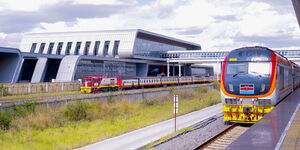The government will in April begin construction of a multibillion-shilling project aimed at ending Nairobi’s crippling traffic congestion.
The Intelligent Transport System (ITS), a high-tech traffic management solution, will be installed across key city roads to streamline movement, reduce travel times, and eliminate the need for human intervention in traffic control.
Nairobi’s traffic congestion is among the worst in Africa, with commuters spending an average of three to five hours daily stuck on the road. The delays cost Kenya billions of shillings annually in lost productivity and fuel consumption.
However, the new ITS project, spearheaded by the Kenya Urban Roads Authority (KURA), aims to tackle this crisis through artificial intelligence-driven traffic management.
The Ksh7.9 billion project will establish a Traffic Management Centre (TMC) at City Cabanas, where police, engineers, and transport experts will monitor real-time traffic data relayed from major roads and intersections.
The first phase, targeting 25 major junctions, is expected to completely change traffic control by replacing roundabouts with automated signals that adjust dynamically based on vehicle flow. Construction will begin in April 2025 and be completed by early 2026.
Some of the key intersections to be upgraded include Moi Avenue/Kenyatta Avenue, Koinange Street/Kenyatta Avenue, Mbagathi Way/Lang’ata Road, and Limuru Road/Muthaiga Road. Additionally, the system will expand along Western Ring Roads, Ngong Road, Outer Ring Road, and Nairobi Eastern Missing Links, covering Nairobi’s most congested arteries.
The system will incorporate intelligent field equipment, including traffic signals, signal controllers, surveillance cameras, and vehicle enforcement systems. These technologies will be interconnected through a high-speed communication network, enabling real-time decision-making at the TMC.
One of the project’s critical components is automated traffic violation detection, which will capture offences such as red-light violations, speeding, and against the law lane changes. The system will generate electronic tickets, ensuring that penalties are issued instantly, reducing graft and human interference in traffic enforcement.
The project will also establish 30 traffic checkpoints, 10 traffic guidance systems, and 80 traffic flow collection points, improving coordination between motorists, law enforcement, and emergency responders. The data collected will help authorities predict congestion patterns and make long-term infrastructure planning decisions.
The initiative is financed by the Economic Development Cooperation Fund through the Export-Import Bank of Korea, with Samsung Construction and Trading Corporation tasked with implementation. The company will also provide technical expertise and train local engineers on how to operate the system.
Once fully implemented, 125 intersections will be upgraded with smart traffic signal control, video surveillance, and automated violation detection. The centralised system will regulate signal timings based on real-time congestion levels, allowing faster movement and reducing idling times at intersections.












